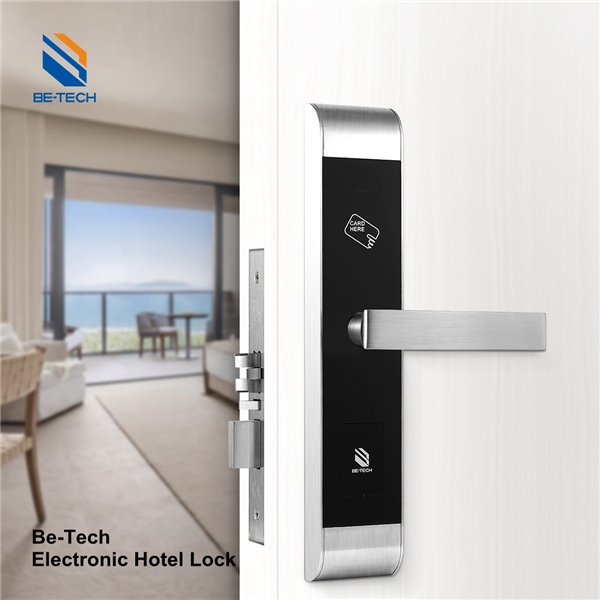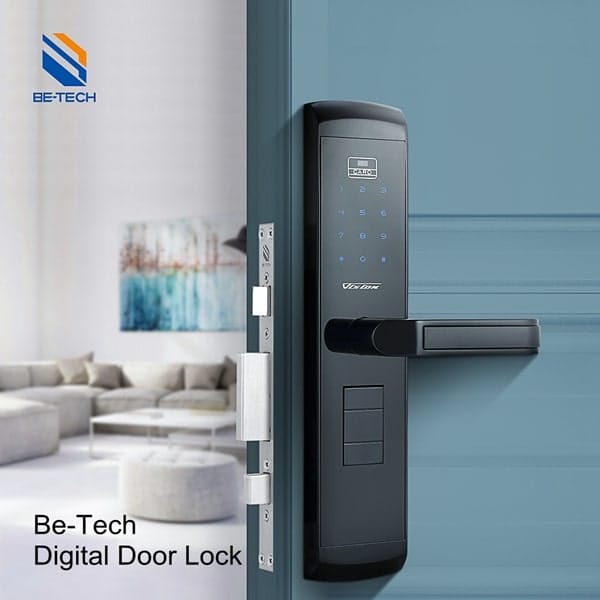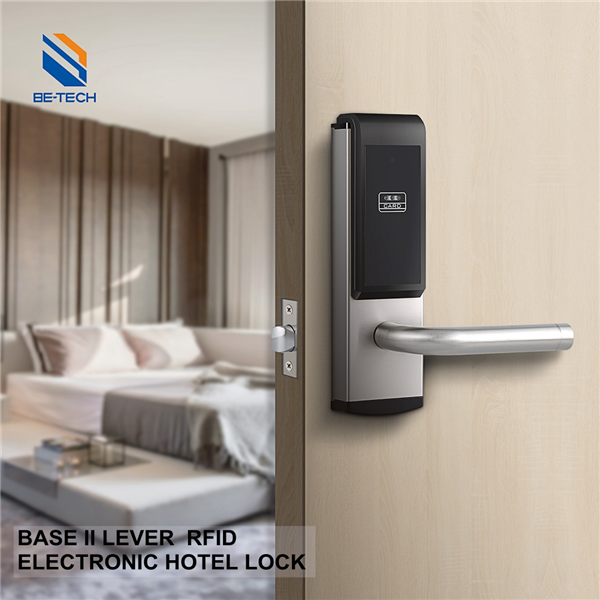In the ever-evolving hospitality landscape, guest expectations are higher than ever, with safety and seamless experiences taking center stage. A recent survey shows that 78% of travelers prioritize safety when choosing a hotel. This makes investing in robust security measures not just a good practice, but a business imperative. High-end hotel locks, with their blend of advanced technology and sleek design, have emerged as a cornerstone of modern hotel security, offering benefits that extend far beyond simply locking doors.
These systems go beyond replacing traditional keys, offering a transformative approach to how hotels manage guest access and security. Imagine a guest checking in using their smartphone, bypassing the front desk entirely, and directly accessing their room. This is the reality high-end hotel locks enable, ushering in an era of convenience and efficiency.
But do these advanced systems deliver a tangible return on investment? This guide explores the compelling ROI of high-end hotel locks, examining how they impact security, guest satisfaction, operational efficiency, and ultimately, your hotel’s bottom line.
Understanding High-End Hotel Locks
High-end hotel locks utilize cutting-edge technologies to provide a seamless and secure experience for guests. These systems are a far cry from traditional key-based locks, leveraging innovations like RFID, Bluetooth, and mobile app integration to deliver enhanced security, operational efficiency, and a touch of modern elegance. Let’s explore the key types of high-end hotel locks:
RFID Hotel Door Locks
RFID (Radio-Frequency Identification) locks use keycards embedded with RFID technology, providing a quick and efficient check-in experience. Guests simply tap their card against the lock to gain entry. RFID technology offers a high level of security, as it is difficult to duplicate these access cards.
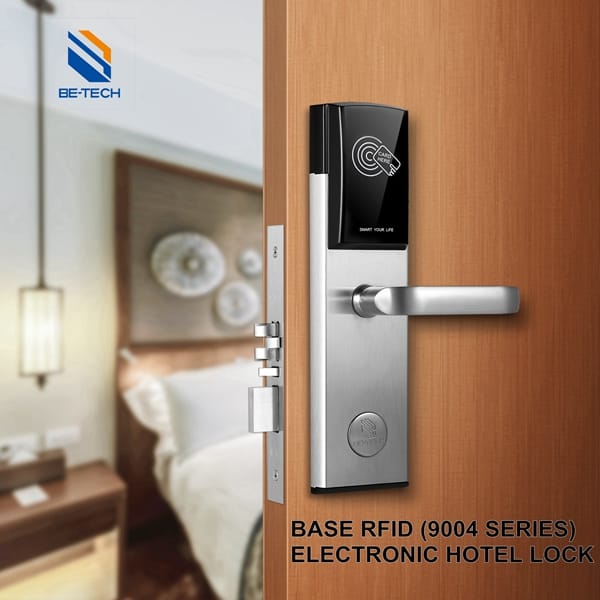
The Be-Tech BASE RFID (9004 Series) is a state-of-the-art electronic lock that leverages advanced RFID technology to provide a reliable and efficient solution for hotel security. This stand-alone RFID hotel door lock is compatible with ISO 14443 A (MIFARE Classic), a globally recognized RFID standard.
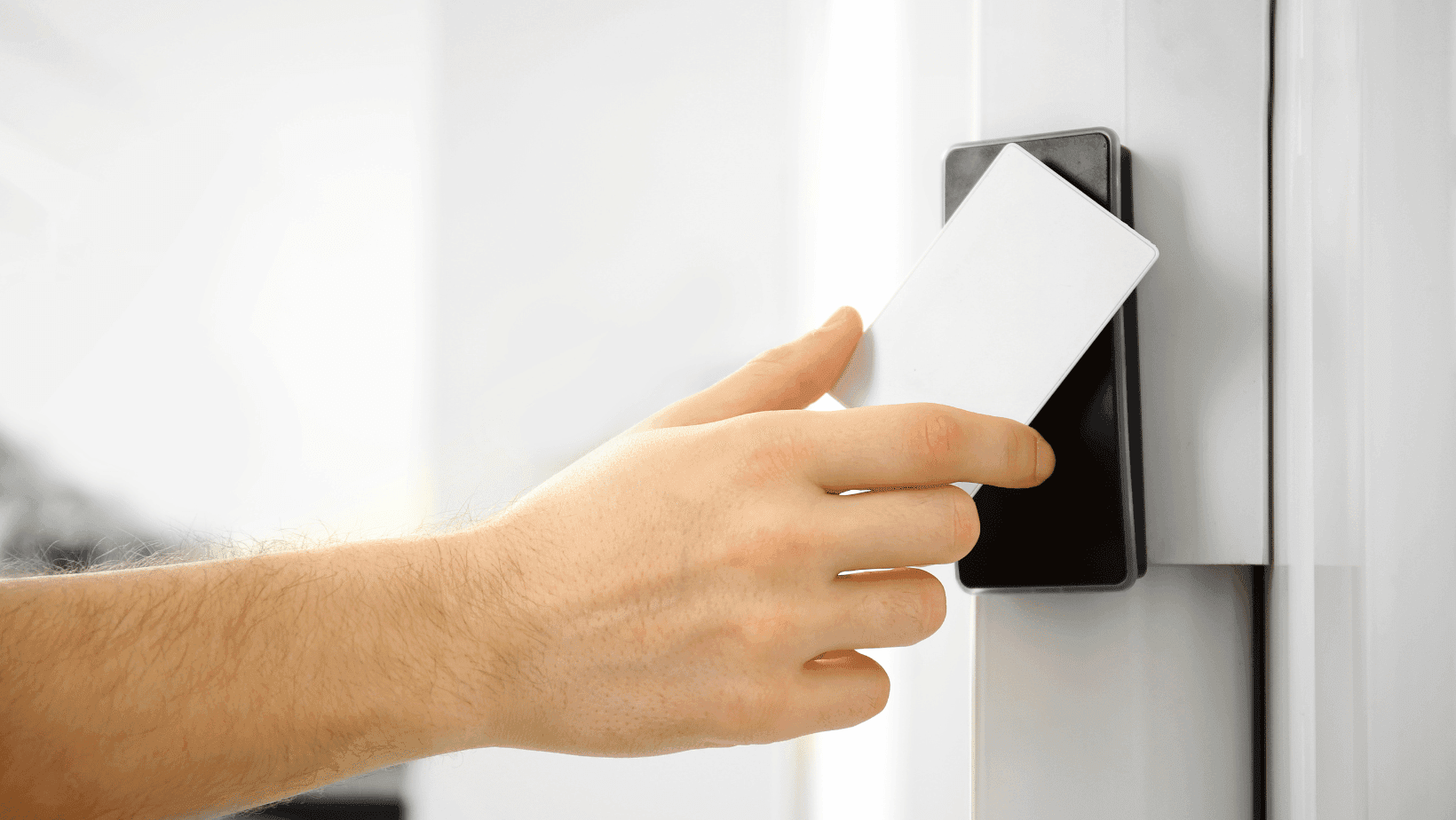
Mobile App-Based Locks
With mobile app integration, guests can unlock their doors using their smartphones. These systems eliminate the need for physical keycards, enhancing convenience and reducing the risk of lost or forgotten keys.

Be-Tech’s SHADOW II RFID series, a mobile app-enabled hotel lock.
Biometric Hotel Locks
For properties seeking the highest level of security, biometric locks that utilize fingerprint or facial recognition technology are available. These systems provide unparalleled access control, ensuring only authorized personnel can enter designated areas. Biometric locks often come with a higher initial investment but offer exceptional security benefits.
“Biometric locks are becoming increasingly popular in luxury hotels and resorts where privacy and security are paramount,” says Kevin, a security consultant specializing in the hospitality industry. “While they require a larger upfront investment, their long-term benefits in terms of enhanced security and reduced risk are undeniable.”
Security Vulnerabilities of Traditional Locks
Traditional lock-and-key systems are inherently vulnerable to security breaches. Keys can be easily duplicated, lost, or stolen, compromising the security of guest rooms and hotel property. For example, a disgruntled former employee could potentially retain a copy of a master key, posing a significant security threat. High-end electronic locks address these vulnerabilities through:
- Encryption: Protecting guest data and access information, making it difficult for unauthorized individuals to gain access.
- Revocable Access: Allowing hotels to deactivate lost or stolen keycards or mobile credentials remotely, preventing unauthorized entry.
- Audit Trails: Tracking access history to monitor usage patterns and identify potential security breaches.
| Traditional Locks | High-End Electronic Locks |
|---|---|
| Vulnerable to picking and bumping | Anti-pick and anti-bump technology |
| Easy key duplication | Keyless entry with unique access codes |
| Wear and tear over time | Weather-resistant design |
| Limited access control | User management and access logs |
| Lack of integration with modern security systems | Integration with smart home systems |
| Inadequate response to advanced threats | Tamper alerts and built-in alarms |
| Inefficient in emergency situations | Remote access control |
| Vulnerable to forced entry | Encryption to protect against hacking |
| Requires physical key, which can be lost or stolen | Biometric authentication options |
| No activity monitoring | Real-time notifications and activity logs |
Benefits of High-End Hotel Locks: Driving ROI
The advantages of high-end hotel locks extend far beyond enhanced security. They contribute directly to a hotel’s bottom line by improving guest satisfaction, streamlining operations, and increasing revenue potential. Let’s explore how these benefits translate into a tangible return on investment:
Enhanced Guest Experience
In the competitive hospitality industry, guest experience is king. High-end hotel locks contribute to a positive guest experience through:
- Seamless Check-In and Access: Keyless entry using smartphones or RFID cards eliminates the need for traditional keys, streamlining the check-in process and reducing wait times. Guests can directly access their rooms upon arrival, creating a smooth and positive first impression.
- Personalized Access: Hotel operators can customize access privileges based on guest profiles. For example, VIP guests can be granted access to exclusive areas, such as a private lounge or fitness center, further enhancing their experience.
- Increased Feelings of Safety and Security: Guests feel more secure knowing their rooms are protected by advanced locking systems that are difficult to bypass. This peace of mind leads to higher guest satisfaction and positive reviews.
A boutique hotel in New York City reported a 15% increase in positive guest reviews after upgrading to a mobile key app-based lock system. Guests consistently praised the convenience and security of being able to use their smartphones to access their rooms.
Increased Security and Reduced Theft
High-end hotel locks act as a powerful deterrent against theft and unauthorized access. This translates into real cost savings for hotels by:
- Minimizing Keycard Loss and Replacement: RFID keycards are less likely to be lost or stolen compared to traditional keys. In the event a card is lost, it can be deactivated instantly, eliminating the security risk and the cost of re-keying locks.
- Deterring Unauthorized Entry: Advanced locking mechanisms and real-time monitoring capabilities make it significantly more difficult for unauthorized individuals to gain access to guest rooms or restricted areas, protecting both guests and hotel property.
- Providing Evidence in Case of Incidents: Audit trails provide a detailed record of who accessed a room and when, which can be invaluable in the event of security incidents or disputes.
A study by the American Hotel & Lodging Association found that hotels using electronic locks experienced a 20% reduction in reported theft compared to those relying on traditional locks.
Improved Operational Efficiency
High-end hotel locks streamline hotel operations in several ways:
- Streamlined Key Management: Eliminating the need for physical keys simplifies key management for hotel staff. Keycards can be programmed and reprogrammed quickly and easily, saving time and resources.
- Remote Management Capabilities: Many systems allow staff to manage guest access remotely, granting or revoking access without physically being present at the door. This is particularly useful for managing late check-ins or addressing lock-related issues efficiently.
- Integration with Property Management Systems (PMS): Integration with hotel management software enables automated check-in processes, room assignment updates, and billing management, reducing administrative burden on staff and minimizing the potential for errors.
Lindner Group’s mk | hotels saw a remarkable 35% adoption rate of cloud-based mobile keys across all 13 of their properties, with some locations achieving adoption rates as high as 65%,” reports Anna von Kuhn, Marketing Director at 4SUITES. “This implementation has transformed their operations, allowing them to operate with just one night manager remotely handling requests for 11 hotels, resulting in significant cost reductions and increased efficiency.
Sustainability and Energy Efficiency
Some high-end hotel locks integrate with room occupancy sensors to control lighting and temperature, contributing to sustainability efforts. When a room is vacant, the system can automatically adjust settings to conserve energy, reducing utility costs for hotels.
The Be-Tech VISUAL series RFID hotel lock integrates with the BISHOTEL system to enable energy-saving features.
Cost Considerations and ROI Calculation
While high-end hotel locks offer compelling benefits, it’s essential to consider the costs involved and calculate the potential return on investment.
Initial Investment
The initial investment in high-end hotel locks will vary depending on factors like:
- System Type: Mobile key app-based systems may have lower upfront costs compared to biometric locks, which often require specialized hardware.
- Property Size: The number of doors needing to be equipped will directly impact the overall cost.
- Integration Complexity: Integration with existing PMS or other hotel systems may add to the initial setup costs.
Ongoing Costs
Ongoing costs associated with high-end hotel locks include:
- Maintenance and Support: Electronic systems require regular maintenance, software updates, and potential repairs.
- Keycard or Mobile Credential Costs: While RFID cards are reusable, there will be costs associated with replacing lost or damaged cards. Mobile key systems may involve subscription fees.
Calculating ROI
To calculate the ROI of high-end hotel locks, consider the following:
- Cost Savings: Reduced theft, lower keycard replacement expenses, and increased staff efficiency contribute to cost savings.
- Revenue Increases: Improved guest satisfaction and enhanced security can lead to higher occupancy rates, premium room pricing, and increased revenue from ancillary services.
| Cost Factors | Amount |
|---|---|
| Hardware Costs | $40,000 |
| Software Setup | $15,000 |
| Installation Fees | $20,000 |
| Maintenance | $10,000 |
| Potential Savings/Revenue | Amount |
|---|---|
| Operational Savings | $25,000 |
| Guest Satisfaction Revenue | $30,000 |
| Reduced Key Management Costs | $10,000 |
Financing and Leasing Options
To make high-end hotel locks more accessible, some vendors offer financing options or lease programs. This can help hotels spread out the costs over time, making the investment more manageable.
[hotel_lock_roi]
Key Considerations for Choosing High-End Hotel Locks
Selecting the right high-end hotel lock system requires careful consideration of several factors:
Security Features
Prioritize systems that offer robust security measures:
- Advanced Authentication Methods: Look for locks that support multiple authentication methods like RFID cards, mobile credentials, and biometric options.
- Real-Time Monitoring: Choose systems that provide real-time alerts for unauthorized access attempts or door left ajar notifications.
- Encryption Technology: Ensure the system uses encryption to protect guest data and access information from potential hacking attempts.
User Experience
The chosen system should be intuitive and user-friendly for both guests and staff:
- Keyless Entry Options: Opt for locks that offer keyless entry methods using smartphones or RFID key cards.
- Intuitive Design: Choose systems with user-friendly interfaces and clear instructions for operation.
Integration with Property Management Systems
Seamless integration with existing hotel management software is crucial:
- PMS Integration: Ensure the lock system can integrate with your PMS to streamline operations and automate tasks like room assignments and guest access management.
- Centralized Control: Choose systems that provide a centralized dashboard for managing all locks, allowing staff to monitor access and make adjustments easily.
Data Privacy and Security
Address concerns about how guest data is protected by the lock system:
- Data Encryption: Confirm that guest information is encrypted both in transit and at rest to prevent unauthorized access.
- Compliance with Data Privacy Regulations: Ensure the system complies with relevant data privacy regulations like GDPR or CCPA.
Scalability and Future-Proofing
Select a system that can grow with your property and adapt to future technological advancements:
- Scalable Architecture: Choose a system that can easily accommodate additional doors or integrations as your hotel expands.
- Upgradable Software and Firmware: Ensure the system supports software updates and firmware upgrades to keep pace with evolving security threats and technology.
Cost vs. Value
While considering the initial investment and ongoing costs, weigh them against the long-term value the system provides:
- Long-Term Cost Savings: Factor in potential cost savings from reduced theft, streamlined operations, and energy efficiency.
- Enhanced Guest Experience: Consider the value of improved guest satisfaction and positive reviews, which can lead to increased revenue.
| Consideration | Details | Importance |
|---|---|---|
| Security Features | Anti-picking, anti-bumping, encryption | High |
| Access Control | User management, temporary access codes | High |
| Integration Capabilities | PMS, smart home systems, mobile apps | High |
| Durability | Weather resistance, lifespan, warranty | Medium |
| Installation Requirements | Compatibility with existing doors, power source | Medium |
| Remote Management | Monitoring, updates, troubleshooting | High |
| User Experience | Ease of use for staff and guests | High |
| Customization Options | Branding, finishes, handle styles | Low |
| Compliance | ADA, fire safety, local regulations | High |
| Cost | Initial investment, maintenance, ROI | Medium |
| Scalability | Ability to expand or upgrade system | Medium |
| Battery Life | For battery-operated locks | Medium |
| Offline Functionality | Operation during power/network outages | High |
| Audit Trail | Logging of access attempts and entries | High |
| Technical Support | Availability, response time, training | Medium |
Be-Tech Lock: A Leading Provider of High-End Hotel Locks
Be-Tech Lock is a leading provider of innovative high-end hotel lock solutions, designed to enhance security, improve guest experience, and streamline operations for hotels of all sizes. With a focus on cutting-edge technology, stylish design, and exceptional customer support, Be-Tech Lock is a trusted partner for hoteliers worldwide.
- BASE RFID (9004 Series): A robust and reliable RFID hotel door lock system featuring a high-security stainless steel mortise lockcase, panic release function, and compatibility with the BISHOTEL software platform.
- SHADOW II RFID Series: A sleek and modern RFID lock system offering mobile key app integration, enhanced security features, and seamless integration with existing hotel systems.
- VISUAL III RFID V5 Series: This series provides a user-friendly interface, remote management capabilities, and high durability.
Conclusion
In the competitive hospitality landscape, where guest expectations are constantly evolving, investing in high-end hotel locks is no longer a luxury but a necessity. These systems deliver a tangible return on investment by enhancing security, elevating guest experience, streamlining operations, and contributing to sustainability goals. By carefully evaluating the features, integration capabilities, and cost considerations, hoteliers can choose the right high-end lock system that meets their property’s unique needs and delivers a significant return on investment.
Ready to take your hotel security and guest experience to the next level? Contact Be-Tech Lock today to schedule a free consultation and discover how our innovative solutions can help you achieve your goals.




